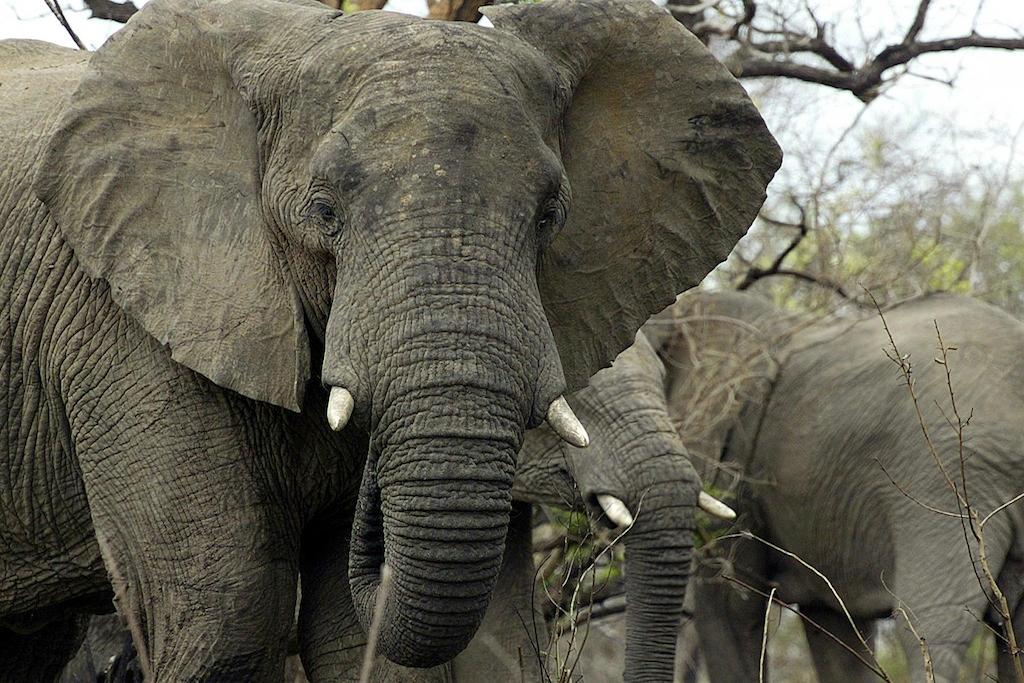Elephants poisoned in Zimbabwe
Nine elephants died and had their tusks removed by poachers after watering holes were poisoned in five game reserves in Zimbabwe, officials say.
For the first time on record poachers have used chemicals to poison water holes in five national parks in Zimbabwe to kill elephants and other wildlife.
Nine elephants were found dead with their ivory tusks removed, according to the BBC.
At least 21 other animals died from ingesting the chemicals, either directly from drinking the water or by eating the animals already dead from ingesting the poison, Voice of America reports. Officials believe those deaths were “accidental” because their carcasses were untouched.
People living in the area are at risk of being poisoned, too. Local residents tempted to cook and eat the meat of dead animals they find or people drinking from the watering places are in danger of suffering the same fate as the wildlife.
The Zimbabwean government has not yet identified the chemicals used, though parks teams are investigating. Though elephants can be found throughout many countries in Africa, World Wildlife Fund (WWF) records show Zimbabwe is home to one of the largest populations on the continent, and therefore also home an intense fight for ivory.
Some believe the poison responsible is called “two step,” according to Voice of America.
"Sometimes [it is] called 'two step,’ meaning the animal — once it consumes water with the poison in it — takes two steps, then it dies, very potent, and that would mean the water in which it has been placed is permanently poisoned. It's very likely the mud itself is contaminated," said Peter Henning, who is involved with wildlife management in southeastern Zimbabwe, according to the Voice of America.
The poisoning of the water holes is part of an upsurge in elephant poaching which has seen an increase in the smuggling of elephant ivory tusks, largely due to high demand from China, according to the Wall Street Journal.
Related: Is China Killing Africa's Elephants?
Most of the sale of elephant ivory is illegal, so official data on the trade is difficult to find. But if recent news of ivory tusk confiscations and seizures in Asia is any indicator, business is booming.
A container ship from Malaysia was seized in Hong Kong with cargo of African ivory worth $1.6 million, according to the Wall Street Journal. And in another example, China and Hong Kong seized more than 6,500 kilograms (14,000 pounds) of ivory over the past two years.
The increase in ivory smuggling is blamed on the growth in China’s huge middle class means the market for ivory has grown exponentially because more people are now able to afford it. China’s growing presence and investment in Africa has opened the door to new possibilities in illicit trading.
"As China expands its presence in Africa in the form of investments and infrastructure development in remote areas, and also areas with significant elephant populations, the incentive or temptation increases for the Chinese worker to look for ivory," said James Isiche, East African director of the International Fund for Animal Welfare, according to the Wall Street Journal.
More importantly, despite the best efforts by wildlife conservation groups, political turmoil and conflict in Zimbabwe has left animal protection as a second thought. The general lawlessness in the country has left no firm hand upholding laws regarding nature.
Zimbabwean President Robert Mugabe has never seemed to be much of an animal rights activist himself. Remember last year when Mugabe planned to send a “Noah’s Ark” of animals to North Korea’s Kim Jong-il as a present?
However, rights groups like Save the Elephants and WWF are not giving up. The population of elephants in Africa is now less than 500,000, down from 1.2 million in the late 1970s, according to WWF.
It's an uphill battle for those working to protect elephant and other wildlife against animal poachers who now have new potent chemicals to deal with in the race against the clock.
The story you just read is accessible and free to all because thousands of listeners and readers contribute to our nonprofit newsroom. We go deep to bring you the human-centered international reporting that you know you can trust. To do this work and to do it well, we rely on the support of our listeners. If you appreciated our coverage this year, if there was a story that made you pause or a song that moved you, would you consider making a gift to sustain our work through 2024 and beyond?
